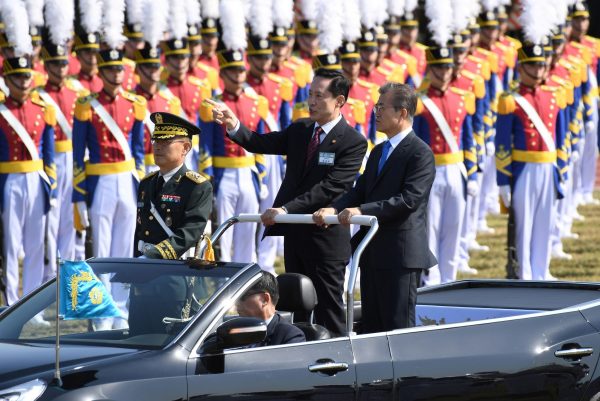In October 2016, three years into Park’s presidency, TV station JTBC shocked South Korea by making a revelation that Park’s associate Choi Soon-sil — a civilian without a governmental position — was involved in decision making about sensitive political and national security issues. Further media pursuits revealed Choi’s involvement in all sorts of illegal and immoral activities.
Choi’s involvement in policymaking and governmental activities resulted in her acquiring significant personal benefits and wealth. Choi appears to have utilised government organs and personnel rather freely. President Park not only acquiesced but often actively accommodated Choi’s pursuits of wealth and power. In the process, Park unconstitutionally shared her presidential power with an unelected civilian.
Public anger in South Korea was immediately on display in Seoul’s city square as more than a million demonstrators gathered near the Blue House (the presidential mansion) every Saturday evening for 13 consecutive weeks. These candlelight protests — known as Chot-bul in Korean — did not witness a single instance of violence, despite protestors facing a wall of police blocking passage to the Blue House.
With the cumulative number of participants reaching fifteen million in a country with a population of fifty million, Chot-bul became a symbol of direct democracy. The National Assembly acted under this pressure and impeached former president Park by well over a two-thirds majority vote in December 2016. The Constitutional Court confirmed the presidential impeachment in March this year, removing Park from office.
Special prosecutors appointed by the National Assembly have indicted Park on 18 different charges. Today, close to 30 people — many of whom were top public officials in the Park administration — are being tried for various criminal charges. The most notable trial outcome so far is the conviction and five-year jail term for Samsung’s vice chair Lee Jae-yong for bribery. This verdict will have a bearing on Park and Choi’s trial. If Lee was indeed involved in bribery, somebody in the Park administration must have been on the receiving end.
In a multi-candidate election held on 9 May, Moon Jae-in from the opposition Democratic Party was elected president. The new President Moon inherited a largely divided country and is faced with multiple pressing challenges, such as wiping out corruption, reviving the economy and uniting the nation. Moon must also steer a country currently in a diplomatic quagmire with the United States, China and Japan — and of course with North Korea.
But several notable features of South Korean society have helped the country overcome and resolve this corruption crisis.
The first is the tenacious nature of the South Korean media. Following the initial media report of the corruption by JTBC, all other media outlets were quick to follow suit. The extent of corruption uncovered surrounding Choi Soon-sil-gate is largely a result of the collective efforts of all South Korean media outlets.
Second is the peaceful chot-bul movement. It did not take a military coup or violent uprising to remove what was perceived to be an extremely corrupt government. South Koreans followed an orderly and legal process of presidential impeachment and everybody was willing to wait patiently despite the long procedure involved.
Third, in a situation where an extreme level of political chaos was possible, South Koreans once again followed what the constitution called for, which was the orderly and legitimate election of a new president within 60 days of Park’s removal from office. At the same time, the criminal legal process for those involved in corruption has continued without violating the human rights of those charged.
Although the Park administration made a mess out of political process in South Korea, the resolution of the crisis was orderly, non-violent and an exemplary exercise of democracy.
Democracy began in South Korea after nationwide demonstrations in 1987, but that democracy has been marred by regionalism, polarisation and corruption. Major political parties are based on regions and classes, meaning that candidates nominated in a party’s main region are assured of re-election even if they achieved nothing as the incumbent or are engaged in corrupt behaviour. This phenomenon leads to a lack of accountability among political leaders, and it has made citizens cynical about politics, as they feel like they cannot change anything through the democratic process.
This may be about to change. Chot-bul was a great opportunity for civic education in South Korea. Citizens now understand what they can do when they see injustice, corruption and political irregularities. Political leaders are now also afraid of ‘people power’. They understand that they can no longer enjoy the comfort of staying in office while doing little and taking a lot. It is time for optimism about the future of democracy in South Korea.
HeeMin Kim is Professor of Political Education at Seoul National University.
An earlier version of this paper was delivered as a keynote speech at the 2017 Korea Update held at Australian National University, September 2017.

